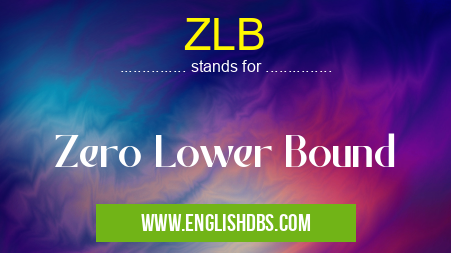What does ZLB mean in UNCLASSIFIED
ZLB stands for Zero Lower Bound. It refers to the situation in monetary policy when interest rates cannot be lowered further due to the constraint of the zero lower bound. Typically, central banks use interest rate adjustments to manage inflation and economic growth. However, when interest rates reach zero, central banks lose this conventional tool.

ZLB meaning in Unclassified in Miscellaneous
ZLB mostly used in an acronym Unclassified in Category Miscellaneous that means Zero Lower Bound
Shorthand: ZLB,
Full Form: Zero Lower Bound
For more information of "Zero Lower Bound", see the section below.
ZLB and Monetary Policy
When the economy experiences deflation or slow growth, central banks may attempt to stimulate economic activity by lowering interest rates. However, if interest rates reach zero, the central bank's ability to further ease monetary policy becomes limited. This situation is known as the ZLB.
Consequences of ZLB
The ZLB can have significant consequences for economic policymaking:
- Ineffective Monetary Policy: With interest rates at zero, central banks cannot use traditional monetary policy tools to stimulate growth or combat deflation.
- Increased Fiscal Stimulus: Governments may rely more on fiscal stimulus, such as increased spending or tax cuts, to support the economy.
- Unconventional Policies: Central banks may resort to unconventional monetary policies, such as quantitative easing or negative interest rates, to try to overcome the ZLB.
Other Implications
The ZLB can also have broader implications:
- Debt Sustainability: Low interest rates can increase the risk of unsustainable debt accumulation, both for governments and private borrowers.
- Financial Instability: Unconventional monetary policies associated with the ZLB may introduce new financial risks and vulnerabilities.
- Economic Growth: The ZLB can hinder economic growth by limiting the effectiveness of monetary policy and creating uncertainty for businesses and investors.
Essential Questions and Answers on Zero Lower Bound in "MISCELLANEOUS»UNFILED"
What is the Zero Lower Bound (ZLB)?
The Zero Lower Bound (ZLB) is a theoretical limit to how low interest rates can go. It is believed that the ZLB is around 0%, as central banks cannot set interest rates below zero.
Why is the ZLB important?
The ZLB is important because it can limit the effectiveness of monetary policy. When the economy is in a recession, central banks typically lower interest rates to stimulate economic growth. However, if interest rates are already at the ZLB, central banks cannot lower them any further, which can make it difficult to stimulate the economy.
What are the implications of the ZLB?
The implications of the ZLB are that central banks may need to use unconventional monetary policy tools to stimulate the economy. These tools could include quantitative easing, forward guidance, and negative interest rates.
What are the risks of unconventional monetary policy tools?
The risks of unconventional monetary policy tools are that they could lead to inflation, asset bubbles, and financial instability.
Final Words: The ZLB is a significant constraint on monetary policy when interest rates reach zero. It poses challenges for policymakers and can have far-reaching economic consequences. Understanding the concept of the ZLB is essential for policymakers, economists, and anyone interested in economic policymaking and its limitations.
